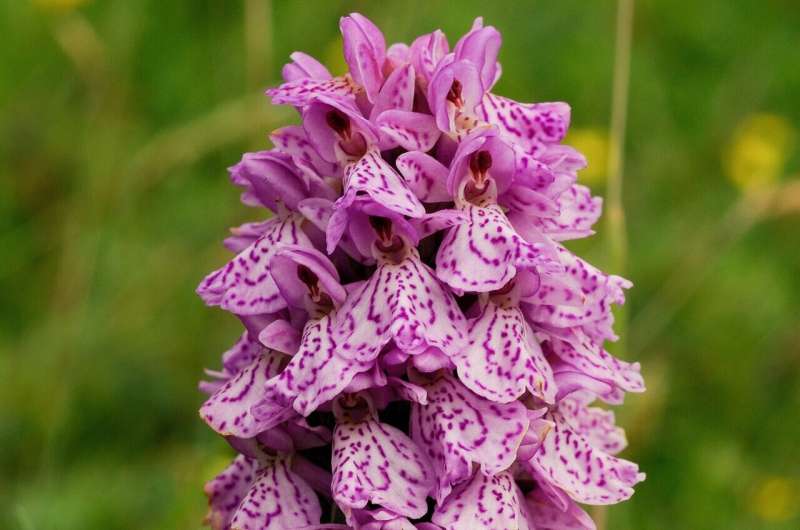This article has been reviewed according to Science X's editorial process and policies. Editors have highlighted the following attributes while ensuring the content's credibility:
fact-checked
peer-reviewed publication
trusted source
proofread
British flower study reveals surprise about plants' sex life

When wild flowering plants are sizing up others they may often end up in a marriage between close relatives rather than neighbors, a new study has revealed.
The findings about the mating habits of Britain's native wild flowers represents the world's first genetic study of all hybrids—the offspring of two different species—from any native flora.
In the animal world, hybrids such as mules are usually infertile and represent an evolutionary dead end. But in plants fertile hybrids are common and can form the raw fuel that drives evolution.
Interspecies hybrids can have a drastic evolutionary impact in the plant world—from outperforming their parents to form new species to genetically swamping rare species and driving them to extinction.
However, the process that leads to the formation of hybrids between wild plant species is highly unpredictable and has puzzled biologists for decades.
To tackle this, researchers at the University of Edinburgh studied more than 1,100 UK flowering plant species, to examine the factors that contribute most to hybrids forming.
The team benefited from extensive previous studies of native British flora, and combined data on ecological factors, genetic analysis and the plants' evolutionary family tree, known as phylogeny.
Their results reveal that genetic factors—how closely related species are—are many times more important than ecological factors, such as geographical distance, in predicting whether hybrids form. Plants have a vast possible mating pool as pollen can travel huge distances by wind or through transport by pollinators, such as bees, whereas genetic differences between species can be hard to overcome.
In contrast to animals, the researchers also found that plant species that have different numbers of chromosome sets, known as ploidy, represent a leaky but not absolute barrier to hybrids forming.
The results could have important implications for the conservation of native British plants, which is among the world's most degraded flora, from the threats of other imported or domestic species.
Too much genetic mixing may threaten native British species with extinction. To protect them, monitoring could prioritize rare species and their close relatives, which may easily form hybrids.
The researchers are now studying the ability of alien invasive species to form hybrids with native British flowers and its impact across the country.
The approach used in this study could lead to new insights into hybrid formation in other floras around the world, as well as examining the impact of other ecological factors such as hybrid fertility and mating system.
The study, published in the journal Proceedings of the National Academy of Sciences, also involved collaborators including researchers from the Royal Botanic Garden Edinburgh (RBGE).
Dr. Alex Twyford, Senior Lecturer in Botany at the University of Edinburgh, who led the research, said, "The British flora is the most intensely studied on Earth, with centuries of effort dedicated to recording and understanding our native plants. We hope our study, as the first to investigate the genetic context of hybridisation between all species in a flora, shows the value in combining classical plant recording with modern genetic data."
Professor Pete Hollingsworth, Director of Science and Deputy Keeper of the Royal Botanic Garden Edinburgh, who also contributed to the research, said, "High throughput DNA barcoding is transforming our understanding of species dynamics and interactions and continued deployment of DNA barcoding approaches will represent a powerful method for monitoring biodiversity in the face of large scale environmental changes."
More information: Max R. Brown et al, Genetic factors predict hybrid formation in the British flora, Proceedings of the National Academy of Sciences (2023). DOI: 10.1073/pnas.2220261120
Journal information: Proceedings of the National Academy of Sciences
Provided by University of Edinburgh




















